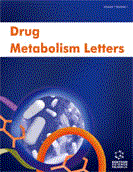Abstract
Parabens are widely used preservatives in topical products, and are estrogenic in numerous experimental models. The typical cutaneous metabolism model, rat skin, hydrolyzes parabens much faster than human skin. Chronic application and absorption of parabens, combined with low metabolism rates, may lead to prolonged estrogenic effects in the skin.
Keywords: Paraben, esterase, skin, epidermal drug metabolism
Drug Metabolism Letters
Title: Comparison of Paraben Stability in Human and Rat Skin
Volume: 1 Issue: 1
Author(s): Heather M. Harville, Richard Voorman and Jeffery J. Prusakiewicz
Affiliation:
Keywords: Paraben, esterase, skin, epidermal drug metabolism
Abstract: Parabens are widely used preservatives in topical products, and are estrogenic in numerous experimental models. The typical cutaneous metabolism model, rat skin, hydrolyzes parabens much faster than human skin. Chronic application and absorption of parabens, combined with low metabolism rates, may lead to prolonged estrogenic effects in the skin.
Export Options
About this article
Cite this article as:
Harville M. Heather, Voorman Richard and Prusakiewicz J. Jeffery, Comparison of Paraben Stability in Human and Rat Skin, Drug Metabolism Letters 2007; 1 (1) . https://dx.doi.org/10.2174/187231207779814300
| DOI https://dx.doi.org/10.2174/187231207779814300 |
Print ISSN 1872-3128 |
| Publisher Name Bentham Science Publisher |
Online ISSN 1874-0758 |
 43
43Related Articles
-
May Endocrine Therapy be Associated with Cognitive Impairment in Breast Cancer Patients?
Clinical Cancer Drugs Targeting the Viral Nucleocapsid Protein in Anti-HIV-1 Therapy
Mini-Reviews in Medicinal Chemistry Curcumin Pellets of Carboxymethylated Tamarind Seed Polysaccharide for the Treatment of Inflammatory Bowel Disease
Drug Delivery Letters Neuronal Histamine and its Receptors: Implication of the Pharmacological Treatment of Obesity
Current Medicinal Chemistry Epigenetic control of cardiovascular health by nutritional polyphenols involves multiple chromatin-modifying writer-reader-eraser proteins
Current Topics in Medicinal Chemistry Bevacizumab for Malignant Brain Gliomas. Which is the Current Evidence?
Recent Patents on Inflammation & Allergy Drug Discovery Structure-Based Virtual Screening for Drug Discovery: Principles, Applications and Recent Advances
Current Topics in Medicinal Chemistry Medicinal and Beneficial Health Applications of Tinospora cordifolia (Guduchi): A Miraculous Herb Countering Various Diseases/Disorders and its Immunomodulatory Effects
Recent Patents on Endocrine, Metabolic & Immune Drug Discovery (Discontinued) Therapeutic Potential of Polyphenols and their Nanoformulations in the Treatment of Colorectal Cancer
Anti-Cancer Agents in Medicinal Chemistry Targeted Radionuclide Therapy of Painful Bone Metastases: Past Developments, Current Status, Recent Advances and Future Directions
Current Medicinal Chemistry Unique Medicinal Properties of Withania somnifera: Phytochemical Constituents and Protein Component
Current Pharmaceutical Design Editorial (Hot Topic: Ductal Carcinoma in situ (DCIS) of the Breast, Biomarkers, Diagnosis, and Treatment of the Disease)
Current Cancer Therapy Reviews Nanoparticle Systems Modulating Myeloid-Derived Suppressor Cells for Cancer Immunotherapy
Current Topics in Medicinal Chemistry Genetic and Pharmacological Modulation of Dendritic Cell-T Cell Interactions as a Therapeutic Strategy for Systemic Lupus Erythematosus
Current Gene Therapy Synthesis and Antibacterial / Anticancer Activities of Compounds Containing Pyrazole Ring Linked to Piperazines
Current Bioactive Compounds Chartreusin, Elsamicin A and Related Anti-Cancer Antibiotics
Current Medicinal Chemistry - Anti-Cancer Agents Hybrid Benzoxazole-Coumarin Compounds Induce Death Receptor-Mediated Switchable Apoptotic and Necroptotic Cell Death on HN-5 Head and Neck Cancer Cell Line
Anti-Cancer Agents in Medicinal Chemistry Muramyl Dipeptide and its Derivatives: Peptide Adjuvant in Immunological Disorders and Cancer Therapy
Current Bioactive Compounds Mitophagy in Carcinogenesis and Tumour Progression- A New Paradigm with Emerging Importance
Anti-Cancer Agents in Medicinal Chemistry Let-7a Could Serve as A Biomarker for Chemo-Responsiveness to Docetaxel in Gastric Cancer
Anti-Cancer Agents in Medicinal Chemistry















